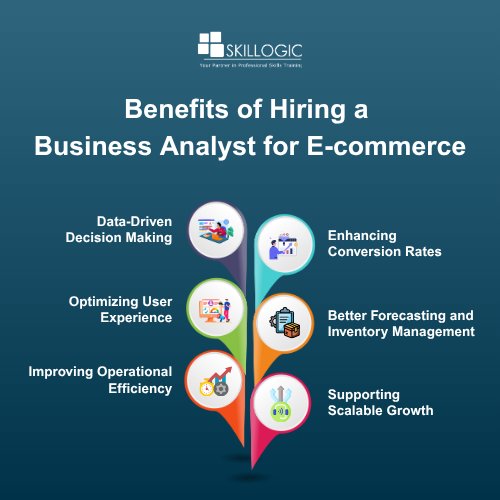Why Every E-commerce Company Needs a Business Analyst
Discover why every e-commerce company needs a business analyst to boost sales, optimize operations, and make data-driven decisions for scalable growth.

In today’s fiercely competitive online marketplace, business analysts in e-commerce roles have become indispensable. E-commerce companies face constant challenges ranging from customer acquisition to inventory management. According to recent statistics, over 90% of e-commerce start-ups fail within the first 120 days—often due to poor decision-making and lack of strategic insight. This staggering figure highlights the crucial need for expert guidance in navigating the complex digital landscape. One indispensable role that’s gaining traction across successful online businesses is that of a business analyst in e-commerce.
The ESG analytics market is expected to grow at a 28% CAGR between 2023 and 2030, driven by regulatory demands and investor pressure.
A business analyst bridges the gap between business goals and technological solutions by analyzing data, optimizing processes, and ensuring that every decision is backed by solid insight. This article explores why every e-commerce company, regardless of size, needs a business analyst to thrive in today’s fast-paced environment and the critical role of business analyst in this success.
The demand for business analysts is expected to rise by 11% between 2023 and 2033, reflecting the increasing need for professionals who can evaluate business processes and recommend improvements. This growth highlights the expanding business analyst benefits that organizations recognize in enhancing decision-making and operational efficiency.
Why Business Analysts Are in High Demand
Business analyst benefits include their ability to interpret large volumes of data and translate it into actionable business strategies. As companies increasingly rely on data to drive decision-making, the role of business analyst becomes more prominent. With vast amounts of information being generated daily, businesses need professionals who can translate raw data into actionable insights.
In fast-moving industries like e-commerce, their role is critical for adapting to market trends, improving customer experience, and staying competitive. They work across departments to align technology with business goals, streamline operations, and enhance productivity. Certifications such as the Certified Business Analysis Professional (CBAP) are highly valued, with certified professionals earning higher business analyst salary compared to their non-certified counterparts.
As digital transformation and automation rise, the need for human insight—especially in interpreting context and making strategic recommendations—becomes even more vital. Unlike siloed roles, the role of business analyst offers a cross-functional perspective that supports better collaboration and long-term growth. Their ability to combine data analysis with business acumen makes them essential in nearly every modern organization, driving both innovation and measurable results.
Market Research Future projects the business analytics market to grow from USD 59.94 billion in 2025 to USD 124.93 billion by 2034, exhibiting a compound annual growth rate (CAGR) of 8.50% during the forecast period—reflecting broader business analytics market trends.
Read these articles:
- How to Measure the Impact of Brand Awareness Campaigns
- How to Improve Your Business Process Mapping Skills
- Advanced Business Analysis Techniques for Professionals
The Role of a Business Analyst in E-commerce
Understanding the role of business analyst in online store success is critical for companies wanting to maintain a competitive edge. A business analyst in e-commerce serves as a crucial connector among stakeholders like developers, marketers, product managers, and end users. Their primary responsibilities include:
Data Gathering and Interpretation
A business analyst collects data from sources such as customer behavior analytics, sales reports, website traffic, and market trends. They sift through large volumes of raw data to extract meaningful insights, identify patterns, and spot emerging opportunities or risks. It provides the critical basis for making strategic choices vital to understanding e-commerce customer behavior.
Requirement Analysis
Business analysts engage with stakeholders to gather and articulate organizational requirements and objectives. Through interviews, workshops, and surveys, they clarify needs, challenges, and expectations. By translating business language into technical specifications, they ensure solutions are aligned with company goals and user demands, a key part of the role of business analyst.
In India, the gig economy has surged by 38% in FY25, as reported by Times of India, highlighting a growing reliance on project-based talent, including Business Analysts, as companies seek flexible and specialized expertise.
Process Optimization
Identifying inefficiencies and bottlenecks in workflows is key. Business analysts map current processes, analyze pain points, and recommend automation opportunities. These enhancements reduce operational costs and create smoother customer experiences, ultimately increasing profitability. This is one of the core business analyst benefits.
Stakeholder Communication
Business analyst facilitates clear communication between teams, ensuring everyone shares the same vision. They organize meetings, prepare reports, and manage expectations to keep projects aligned with business objectives.

Key Benefits of Hiring a Business Analyst for E-commerce Companies
Let’s explore how hiring a business analyst brings significant advantages to any online business striving for growth and operational excellence.
Data-Driven Decision Making
A key benefit is the capability to base decisions on data insights. Instead of relying on assumptions, a business analyst examines customer data and market trends to provide actionable recommendations. This helps:
- Optimize marketing campaigns by targeting the right audience.
- Understand buyer behaviour and preferences, improving e-commerce customer behaviour analysis.
- Allocate resources more efficiently.
Optimizing User Experience
User experience is king in e-commerce. Business analysts assess the complete customer experience to pinpoint obstacles leading to drop-offs. By analyzing click patterns and feedback, they recommend UI/UX improvements that increase engagement and conversions, showing clearly how business analysts improve sales.
Improving Operational Efficiency
Every thriving online shop is powered by a finely tuned and efficient operation. Business analysts help streamline logistics, automate repetitive tasks, and refine backend processes like order fulfilment and customer support—boosting productivity and customer satisfaction. These operational gains represent significant business analyst benefits.
Enhancing Conversion Rates
Conversion Rate Optimization (CRO) is essential for success. Business analysts use A/B test results and behavioural data to suggest improvements that increase the percentage of visitors who complete purchases, further illustrating how business analysts improve sales.
Better Forecasting and Inventory Management
Inventory mismanagement leads to lost sales and higher costs. Business analysts use data to forecast demand, maintain optimal inventory levels, reduce stockouts, and avoid overstocking—a critical area where the business analyst in e-commerce role adds value.
Supporting Scalable Growth
As companies grow, systems must scale without compromising quality or efficiency. Business analysts ensure that technology and workflows evolve alongside the company, enabling sustainable, scalable success. This long-term impact emphasizes the business analyst impact on e-commerce growth.
Read these articles:
- How to become a Business Analyst in India?
- Business Analytics Scope in India
- How to Become a Business Analytics Expert in India?
Business Analyst Case Studies: From Insights to Results
Case 1: Business Analyst Driving Sales Growth
Scenario overview:
An online fashion retailer faced stagnant sales despite growing traffic. High cart abandonment and low repeat purchases were major concerns.
Role of the Business Analyst and impact:
The business analyst analyzed customer behaviour and checkout processes. They identified unforeseen shipping charges as a major obstacle for users. By recommending transparent fee disclosures and simplifying the checkout, they improved conversions. Personalized promotions based on past purchases also increased loyalty. In three months, conversions rose 20% and repeat purchases 15%. This case perfectly illustrates the business analyst case study showing how business analysts improve sales.
Case 2: Business Analyst Optimizing Supply Chain
Scenario overview:
A consumer electronics company struggled with frequent stockouts and overstock, leading to lost revenue and increased storage costs.
Role of the Business Analyst and improvements:
The analyst implemented demand forecasting using historical sales and trend analysis. They reduced supplier lead time issues and optimized inventory management systems. Results included a 30% drop in stockouts and a 25% reduction in excess inventory, significantly improving cash flow and customer satisfaction. This example stands out as a powerful business analyst case study of impact in e-commerce.
As e-commerce continues to evolve, the ability to analyze data and turn it into actionable strategies is more crucial than ever. From increasing conversion rates to refining supply chains, business analysts are catalysts of transformation—helping companies make smarter, faster, and more customer-focused decisions while shaping promising business analytics market trends.
If you're aiming to enter this high-growth field or advance your career, the right training can make a significant difference. Enrolling in a Business Analyst course in Bangalore is a smart move toward unlocking opportunities in the digital economy.
SKILLOGIC’s Offline Business Analyst course in Bangalore offers hands-on training, expert-led instruction, and globally recognized certification. With a strong presence in major cities and over a decade of experience, SKILLOGIC equips you with practical skills in analytics, Six Sigma, PMP, cybersecurity, and cloud computing—empowering you to thrive in today’s dynamic online marketplace.

0
150